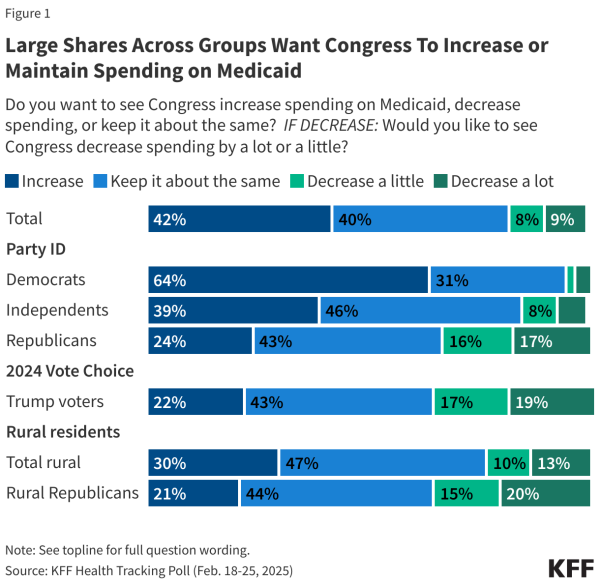
As Republican lawmakers consider making changes or cuts to Medicaid as part of their push to offset the cost of their tax plans, a new poll from healthcare foundation KFF highlights a simple truth they’ll have to contend with: Americans, including Trump supporters, like the program and overwhelmingly want to see funding for it increase or stay about the same.
Just 17% of adults surveyed said they want to see Medicaid funding decreased compared to 42% who want an increase and 40% who want spending to stay around current levels. “Majorities of Democrats, Republicans, independents, Trump voters, and adults living in rural areas say Medicaid funding should either increase or be kept about the same, though about one-third of Republicans want spending to decrease,” KFF notes. “The public’s staunch opposition to Medicaid cuts likely reflects the fact that most people have a connection to the program. About half (53%) of adults, including a similar share of those living in rural areas, say they or a family member has received help from Medicaid at some point.”
Nearly all those surveyed, 97%, say that Medicaid is at least somewhat important to their local community, and 73% call it very important — perhaps unsurprising given that Medicaid covers about one in five people in the United States.
Republicans including House Speaker Mike Johnson insist that they are not going to cut Medicaid benefits for deserving recipients and are focused on rooting out waste, fraud and abuse and making the program more efficient. Republicans have also discussed implementing work requirements and undoing or cutting back the Affordable Care Act’s expansion of the program, including enhanced payment rates to states.
KFF’s poll finds that 62% of Americans support the idea of work requirements and a similar percentage oppose eliminating a 90% federal matching rate created under the ACA.
“However, public opinion on both proposals is malleable when people hear arguments or are given more information,” KFF’s team says. “Overall support for work requirements drops from 62% to 32% when those who initially support the proposal hear that most people on Medicaid are already working and many would risk losing coverage because of the burden of proving eligibility through paperwork. Overall support also drops to 40% after supporters hear that there would be an increase in state administrative costs to oversee the work requirement. On the other hand, when opponents of work requirements hear the argument made by supporters that imposing such requirements could allow Medicaid to be reserved for groups like the elderly, people with disabilities, and low-income children, support for work requirements increases from 62% to 77%.”
The poll was of 1,322 U.S. adults was conducted from February 18 to 25. The margin of error for the full group is plus or minus 3 percentage points.
The bottom line: Republicans insist that they are only targeting “waste, fraud and abuse,” but that alone is unlikely to generate the cost savings they want to be able to enact t heir full tax-cut agenda. And as the poll suggests, proposing deeper cuts to Medicaid would carry extreme political risk.
